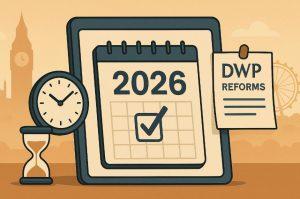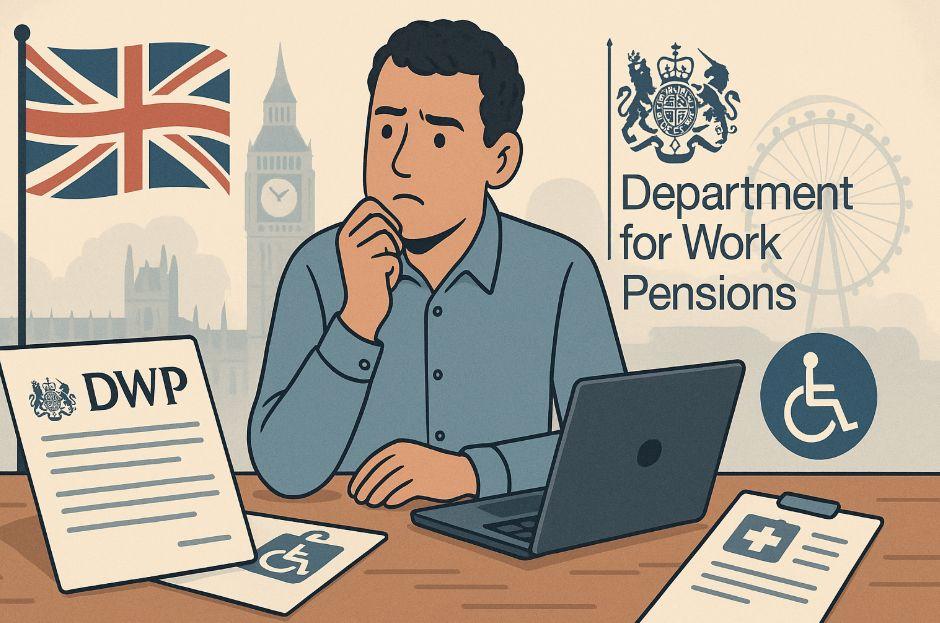In a significant move toward reshaping the UK’s welfare system, the Department for Work and Pensions (DWP) has announced major reforms to the Personal Independence Payment (PIP) scheme, scheduled to roll out in 2026. These reforms are poised to affect hundreds of thousands of claimants across the UK, especially in urban hubs like London, where disability benefits play a vital role in supporting daily living.
With the growing demand for a fairer, more transparent assessment process and a shift in how support is provided, the reforms are drawing close attention from claimants, advocacy groups, and policymakers alike. This blog explores what the DWP PIP Reforms 2026 entail, who they will impact, and how individuals can prepare for the upcoming changes.
What Are the DWP PIP Reforms Set for 2026?

Overview of the Proposed Changes
The DWP is planning a comprehensive overhaul of the current Personal Independence Payment (PIP) system with the aim of simplifying the claims process, reducing appeals, and improving the overall user experience. This includes a transition toward a more personalised system, with less reliance on face-to-face assessments and increased use of existing medical evidence.
Policy Goals and Motivation
The reforms are driven by growing criticism of the current PIP structure, particularly around its perceived complexity and the stress it places on claimants. The government seeks to create a model that is more adaptive to individual needs while curbing administrative overhead and appeals.
How Will These Changes Affect Current PIP Claimants?
Claim Continuity for Existing Recipients
Current PIP recipients will not lose their benefits overnight. The government has promised a gradual transition, where ongoing payments will continue during the rollout period. However, reassessments under the new model may be required in some cases to align with the updated eligibility framework.
Potential Variations in Payment Amounts
Under the new framework, payment levels might be adjusted to reflect the updated scoring and needs-based model. While some recipients may see no change or even a slight increase, others could face reductions if they no longer meet revised eligibility thresholds.
What Changes Are Being Proposed for PIP Assessments?
Shift from Face-to-Face to Evidence-Based Reviews
One of the most anticipated changes is a move away from routine face-to-face assessments. Instead, the DWP plans to rely more heavily on existing medical reports and GP evidence. This is intended to reduce the stress and inconvenience claimants often experience during in-person evaluations.
Revised Criteria and Scoring Mechanisms
The reform introduces a recalibration of how needs are assessed. Mental health conditions, long-term degenerative illnesses, and fluctuating conditions are expected to be evaluated more fairly under a new scoring matrix that better reflects daily challenges.
When Will the 2026 PIP Reforms Be Implemented?

Timeline and Rollout Strategy
The implementation is planned for mid to late 2026, with pilot testing set to begin in select regions in early 2026. London and other metropolitan areas may be prioritised in the pilot due to higher claimant volumes and greater administrative capacity.
Transition Management and Communication
The DWP has committed to clear communication throughout the transition. A dedicated support service and informational materials will be provided to help claimants understand the implications and next steps.
Who Will Be Most Affected by These DWP Changes?
Vulnerable Groups and At-Risk Individuals
Claimants with mental health conditions, learning disabilities, and fluctuating medical conditions could experience the most significant effectsboth positive and negative. The government has stated that they aim to better support these groups, but practical outcomes will depend on the execution of the new guidelines.
Access to Support Services
Additional support structures will be introduced to guide claimants through the reforms, including online resources, helplines, and face-to-face community support in specific boroughs of London and across the UK.
What Are Experts and Charities Saying About the Reforms?
Reactions from Disability Advocacy Groups
Charities like Scope and Disability Rights UK have responded with cautious optimism. They welcome the DWP’s acknowledgment of past system flaws but remain vigilant, urging the government to implement safeguards that prevent unjust disqualifications and delays.
Feedback from Policy Analysts
Think tanks and social policy analysts highlight the importance of evidence-based implementation. They stress that the real measure of success will be whether the reforms reduce appeals and improve claimant satisfaction without restricting access to support.
How Can Claimants Prepare for the PIP Reforms?

Reviewing Medical Evidence
Claimants are advised to start organising their medical documents, treatment history, and letters from healthcare professionals. These records will be central to the new assessment process.
Seeking Reliable Advice
Claimants should consult with welfare advisors or legal experts specialising in disability benefits. Many local councils and charities offer free consultations or workshops to help individuals understand their rights.
Comparison of Current PIP vs. Proposed 2026 Reforms
| Aspect | Current PIP System | Proposed 2026 Reforms |
| Assessment Method | Primarily face-to-face assessments | Evidence-based reviews with fewer in-person assessments |
| Scoring System | Fixed descriptors and point system | Revised scoring that reflects fluctuating and mental health conditions |
| Reassessment Frequency | Frequent periodic reviews | Longer intervals with fewer reassessments |
| Support Services | Limited support during application | Enhanced support and guidance resources |
| Medical Evidence Usage | Often supplemented by new assessments | Greater reliance on existing medical documentation |
| Claimant Communication | Letters and phone calls | Improved digital communication and claimant portals |
How Will the DWP Handle Appeals and Disputes Under the New System?
Improvements to the Appeals Process
The DWP has acknowledged that the current PIP system has a disproportionately high number of appeals, often due to miscommunication or lack of sufficient evidence during the initial assessment. As part of the 2026 reforms, the department plans to simplify the process of mandatory reconsideration (MR) and tribunal appeals.
Claimants will be able to access a redesigned digital portal where they can upload new evidence, track the status of their appeal in real time, and receive regular updates from case managers. This approach is aimed at reducing unnecessary delays and minimising the backlog that has historically plagued disability benefit appeals.
Greater Transparency and Case Review Mechanisms
The reforms are expected to incorporate a new system for internal reviews. Before any appeal reaches tribunal, a specialist team will re-evaluate the application, ensuring it was assessed fairly based on all submitted medical evidence. This is intended to increase claimant trust and reduce the need for court involvement.
What Are the Long-Term Goals Behind the DWP’s 2026 Welfare Reforms?

Shaping a More Sustainable and Fair Benefits System
Beyond the immediate changes to PIP, the reforms reflect a larger shift in the UK government’s approach to social welfare. The long-term objective is to create a benefits system that is more adaptable to diverse needs, especially in light of the growing recognition of mental health, hidden disabilities, and complex medical conditions.
The emphasis is on sustainability both in financial terms and in administrative efficiency. By reducing duplication, enhancing digital systems, and streamlining assessments, the government aims to cut long-term costs while improving outcomes for claimants.
Encouraging Better Integration With Health and Social Care
The PIP reforms are also intended to better align with the NHS and local authority services. This includes data sharing agreements (with consent), improved coordination of care, and access to multi-agency support services. The goal is to remove the silos that often leave vulnerable individuals navigating complex systems on their own.
Conclusion
As the DWP PIP reforms for 2026 approach, claimants should stay informed, organised, and proactive. The shift to a more evidence-driven and streamlined process could offer positive outcomes for many. However, the complexity of disability support means that preparation and knowledge are key.
Staying connected with trusted sources, keeping medical documentation updated, and seeking out advisory services will help individuals navigate these changes with greater confidence and control.
FAQs About DWP PIP Reforms 2026
What is the purpose of PIP in the UK?
Personal Independence Payment (PIP) is designed to help individuals with long-term health conditions or disabilities manage extra costs related to their daily living and mobility needs.
Will all claimants be reassessed under the new rules?
Not all claimants will face immediate reassessment. The DWP will prioritise certain cases during the rollout, and others may continue under existing criteria for a period.
Is PIP being completely replaced in 2026?
No, PIP is not being replaced entirely. Instead, the system is undergoing major reforms to make the process more efficient and accessible.
How can I check if I’m eligible for PIP in 2026?
Eligibility criteria will be updated, and the DWP is expected to release online tools and updated guidance for assessing qualification under the new rules.
What resources are available to help claimants understand the reforms?
Government websites, welfare rights organisations, local councils, and disability charities offer guides, webinars, and helplines to assist claimants.
Will carers be impacted by the new DWP policies?
Indirectly, yes. Changes to claimants’ benefits can affect carers, particularly in terms of associated benefits like Carer’s Allowance and overall household income.
How does this affect other disability benefits?
The reforms are currently focused on PIP, but future welfare changes may impact other benefits. Monitoring updates from DWP and support organisations is essential.









Leave feedback about this